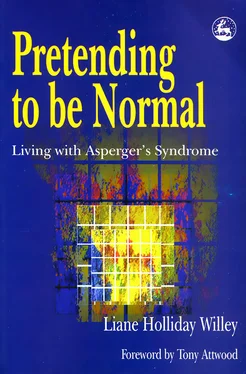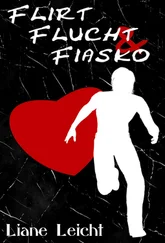Liane Holliday Willey - Pretending to be Normal
Здесь есть возможность читать онлайн «Liane Holliday Willey - Pretending to be Normal» весь текст электронной книги совершенно бесплатно (целиком полную версию без сокращений). В некоторых случаях можно слушать аудио, скачать через торрент в формате fb2 и присутствует краткое содержание. Город: London, Год выпуска: 2000, ISBN: 2000, Издательство: Jessika Kingsley Publishers, Жанр: Психология, Биографии и Мемуары, на английском языке. Описание произведения, (предисловие) а так же отзывы посетителей доступны на портале библиотеки ЛибКат.
- Название:Pretending to be Normal
- Автор:
- Издательство:Jessika Kingsley Publishers
- Жанр:
- Год:2000
- Город:London
- ISBN:1 85302 577 1
- Рейтинг книги:4 / 5. Голосов: 1
-
Избранное:Добавить в избранное
- Отзывы:
-
Ваша оценка:
- 80
- 1
- 2
- 3
- 4
- 5
Pretending to be Normal: краткое содержание, описание и аннотация
Предлагаем к чтению аннотацию, описание, краткое содержание или предисловие (зависит от того, что написал сам автор книги «Pretending to be Normal»). Если вы не нашли необходимую информацию о книге — напишите в комментариях, мы постараемся отыскать её.
Pretending to be Normal — читать онлайн бесплатно полную книгу (весь текст) целиком
Ниже представлен текст книги, разбитый по страницам. Система сохранения места последней прочитанной страницы, позволяет с удобством читать онлайн бесплатно книгу «Pretending to be Normal», без необходимости каждый раз заново искать на чём Вы остановились. Поставьте закладку, и сможете в любой момент перейти на страницу, на которой закончили чтение.
Интервал:
Закладка:
As I asked her if she understood me, it became clear that not only had she taken my words to heart, but that she was also prepared to hand the employee a piece of yet another Asperger’s quality she shares with me — her very strong temper. Given a choice, I would rather my daughter stand up and proclaim herself in charge, than I would have her find a corner to disappear in, even if it means having to see her angry — short of violence, of course. Her anger, at least, proves she has not given up on herself and that is no small task. Too often those with AS get lost in a world of discouragement and damaged self-esteem, and in that world there are few avenues for happiness. I try, at every opportunity I am given, to show both my daughter and myself that so long as we are soundly willing, we can find a way to create good things for ourselves — no matter what.
Toward that goal, I routinely tell my daughter she must tell herself it is okay to assess and meet her own needs. I want her to know if she feels the need to lay suspended upside down, or stomp her feet when she walks to feel connected, or squeeze balloons filled with flour, or run to me with whispers of how weird someone appears to her, or seek the company of her dog rather than her friends, of punch a punching bag, even if she feels she needs to shout to keep from disappearing into the abyss so many with autistic spectrum disorders find, then my husband and I let her do so. Our only request as parents who care deeply for her, is that she do nothing to hurt herself or others. Anything within the boundaries of safety, both mental and physical, are boundaries we let her explore, knowing that each is bound to be unique and particularly adaptable to any number of situations.
I know firsthand that my daughter’s struggles will not be few, but frequent. But I am very optimistic that she will find her way, just as I have. Beyond the basics, beyond the day-to-day routines, I know the real me, the one that truly matters, was nurtured and shaped by the lessons my mother and father taught me. The heart and soul of their parenting was simply that I take pride in my individuality, idiosyncracies and all. I hold that counsel to be sacred, for what flows from its simple premise is a wellspring of self-confidence, self-assurance, and a dogged commitment to do one’s best. These realistic ideals are important to every child’s well-being and good health, but perhaps even more so to the child who is growing up while learning to live in a home touched by AS. They are the very lessons I must teach my own children, if I expect them to survive and thrive in an environment shared with me. Why? Because Asperger’s Syndrome can mystify those who know nothing about it, particularly in my case when its manifestation has become so subtle. My children cannot point to an obvious physical disability and silently ask others to give their mother a break. Consequently, they cannot expect others to understand me as they do. My girls must learn how to deflect public opinion of their mom, just as they have to look harder to find reasons to be proud of me. I think they have. Within the walls of positive self-esteem, individual fulfillment and goal-setting, I think my girls have learned to accept the public me without too much pain or embarrassment. Sure, they remind me not to talk to myself in public, not to use a loud voice around others, not to bring up the subject of my dogs to every living soul, not to ramble on in my conversations, not to cover my ears at the park and yell «Who in their right mind can stand all this noise?» and not to cover my nose and scream «My God that stinks!» But that is just fine with me, for all along the way, they never, ever forget to tell me that despite all of my quirks and batty nuances, they love me no matter what.
To be certain my family’s love and graciousness toward me never wanes, I tell them as often as I remember that it is perfectly all right and acceptable for them to discover moments when they are unhappy with my behavior, embarrassed by my reactions or even horrified by my conversations. Thankfully, I believe they listen to me when I tell them this, for the last thing I want to do is give them cause to feel badly about themselves should they ever entertain the wish that their mom was more like other moms. I explain to them that every child would like the ability to re-design their parents and I lead them to the understanding that it is perfectly normal to want the fairytale mom. Who wouldn’t?
But, along the way, I also try to instill in them a higher moral code, one that is far more vulnerable to decency and goodness. I want my girls to find reasons to enjoy all the people in their lives, even if it means they have to tap into every creative well in their soul, to do so. I want them to truly, way down deep in their hearts, know that all people, and not just their mom, are worthy, viable and exceptional beings who have much to give and even more to share. So long as my family knows who I am, I am rather content. As to others, well, their opinions tend to matter less and less to me. Nonetheless, I do try to help those who need to know me well, see that I simply move to my own music. How I do this, depends on who the person is and on how receptive they are to accepting and acknowledging my differences. If, for example, I am faced with someone who continues to dismiss AS as a passing fad or someone who refuses to believe me when I explain what I really think and feel under certain situations, I separate myself from them as best I can. I have taught myself to believe that if they were my friend, they would not dismiss nor disbelieve me; they would want to know all about me so they could meet me half way. On the other hand, when I sense AS is important to someone, I grow as animated and excited as a returning traveler sharing her fondest memories of a trip well enjoyed. I open my heart and my mind and let everything I know about autistic spectrum disorders fill the silence with both the good and the bad, the challenging and the exciting. I rely on honesty and personal experience and the research of others to guide my talk, never stopping to ask if I am making myself clear, only trying to reveal doors of knowledge that whomever I am speaking to can open when they are ready.
As I look at where I was thirty, twenty, ten, even five years ago, I note how much I have changed, how much I have progressed toward the standard definition of normal. There are times when I approach this fact with a certain amount of excitement and optimism, for I think my history illustrates the myriad of possibilities that can come when the efforts of loyal support systems and friends are combined with a series of proper and early intervention techniques. But I also know that in essence, my AS traits never had a chance to take over my bid for a more mainstreamed life. My IQ is too high, my creativity too productive, my family and friends too supportive for any other option to have emerged.
In some ways I cannot help but be happy I have found a mostly comfortable place to rest. A point in life that sits balanced between neurologically typical and Asperger’s Syndrome. In other ways, I meet who I am with a certain amount of sadness, for I often wonder what parts of me I had to leave behind before I came to this place in my life. Would I have been a better writer if I had allowed my skewed take on the world to find its way to paper? Was there a wonderfully quirky and surreal book hidden beneath my idiosyncracies that will now never be found because I can bridle so many of my old habits and thinking patterns? If I had not been taught and encouraged to be as social as I now am, would I have found a different but somehow more satisfying kind of individualized lifestyle? Would I have avoided my irritable bowel syndrome and my panic attacks, if I had not tried so hard to pretend to be normal?
Читать дальшеИнтервал:
Закладка:
Похожие книги на «Pretending to be Normal»
Представляем Вашему вниманию похожие книги на «Pretending to be Normal» списком для выбора. Мы отобрали схожую по названию и смыслу литературу в надежде предоставить читателям больше вариантов отыскать новые, интересные, ещё непрочитанные произведения.
Обсуждение, отзывы о книге «Pretending to be Normal» и просто собственные мнения читателей. Оставьте ваши комментарии, напишите, что Вы думаете о произведении, его смысле или главных героях. Укажите что конкретно понравилось, а что нет, и почему Вы так считаете.












